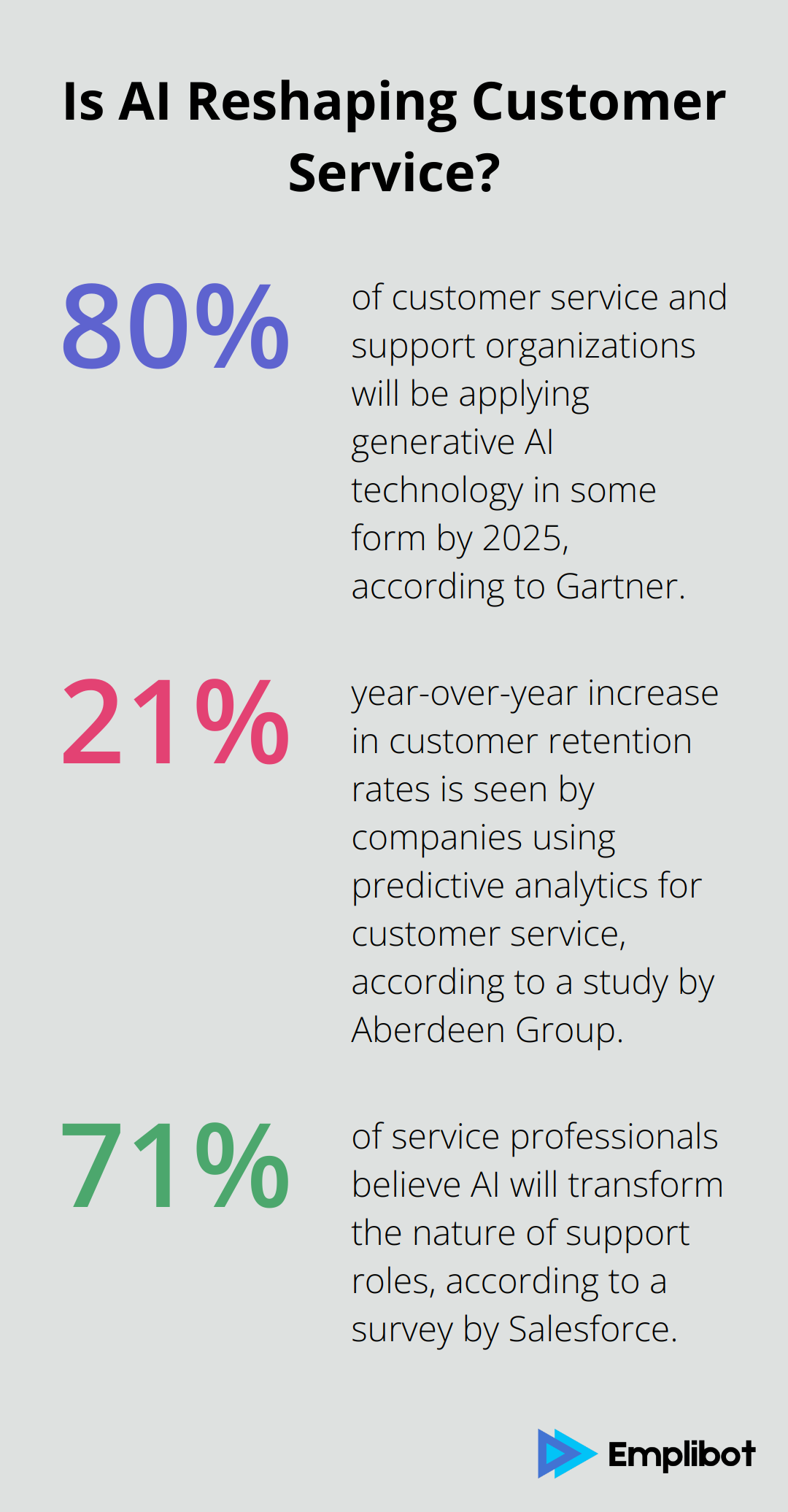AI in marketing, sales, and service is reshaping how businesses interact with customers. The landscape is evolving rapidly, with groundbreaking technologies transforming these core business functions.
At Emplibot, we’ve witnessed firsthand the dramatic impact of AI on customer engagement and operational efficiency. This blog post explores the current state of AI in these critical areas and offers insights into what lies ahead for businesses in 2025.
How AI Will Transform Marketing in 2025
The Dawn of AI-Driven Personalization
AI will revolutionize marketing in 2025 by enabling hyper-personalization at an unprecedented scale. Algorithms will analyze vast amounts of data to create tailored marketing experiences for each individual. A study by Accenture reveals that 91% of consumers prefer to shop with brands that provide relevant offers and recommendations. This level of personalization will encompass entire customer journeys across multiple touchpoints.

AI will enable real-time content adaptation on websites, adjusting layouts, messaging, and offers based on a visitor’s behavior, preferences, and even current mood. This dynamic approach will boost conversion rates and customer satisfaction significantly.
Predictive Analytics: Marketing’s New Crystal Ball
AI-powered predictive analytics will become a game-changer for marketers. By 2025, approximately 30% of companies are expected to leverage AI to enhance their testing processes, a significant increase from the 5% currently doing so. This capability will lead to more effective campaign planning, inventory management, and resource allocation.
Marketers will use these insights to address customer needs proactively, sometimes even before the customers themselves are aware of them.
AI-Generated Content: Quality Meets Scale
Content creation will undergo a significant transformation with AI. Advanced language models will produce high-quality, engaging content at scale, allowing marketers to maintain a consistent brand voice across all channels. Human creativity will remain crucial in guiding these AI systems and adding the emotional touch that resonates with audiences.
A survey by the Content Marketing Institute reveals that 61% of marketers plan to increase their use of AI for content creation by 2025. This shift will enable businesses to produce more content, faster, and at a lower cost, while maintaining high standards of quality and relevance.
The Voice and Visual Search Revolution
As voice assistants and image recognition technologies advance, optimizing for voice and visual search will become essential. By 2025, it’s predicted that 50% of all searches will be voice-based. This shift will require marketers to adapt their SEO strategies, focusing on natural language patterns and conversational keywords.
Visual search will also gain prominence, with platforms like Pinterest and Google Lens leading the way. Marketers will need to ensure their product images are optimized for visual search algorithms, potentially opening up new channels for discovery and engagement.
The marketing landscape of 2025 will be unrecognizable compared to today’s standards. As we explore these AI-driven marketing strategies, it’s clear that businesses must adapt to stay competitive. But how will AI impact the sales process? Let’s examine the transformative effects of AI on sales in the next section.
How AI Will Reshape Sales in 2025
Intelligent Lead Scoring and Qualification
AI transforms lead scoring and qualification processes. A Harvard Business Review study reveals companies using AI for sales increase their leads by over 50%. These AI systems analyze numerous data points (online behavior, social media activity, past interactions) to identify the most promising leads.
Salesforce’s Einstein AI provides a simpler, faster, and more accurate solution than traditional rules-based lead scoring approaches, allowing sales teams to focus their efforts more effectively. This precision in lead scoring will become standard by 2025, improving conversion rates and sales efficiency significantly.
AI-Powered Sales Forecasting and Pipeline Management
AI-powered predictive analytics revolutionize sales forecasting and pipeline management. Gartner reports that 75% of B2B sales organizations will supplement traditional sales playbooks with AI-guided selling solutions by 2025. These tools analyze historical data, market trends, and individual customer behaviors to predict future sales outcomes accurately.

Companies offer AI-driven sales forecasting tools that provide real-time insights into pipeline health and potential roadblocks. As these technologies mature, sales managers will gain unprecedented visibility into their team’s performance and make data-driven decisions to optimize sales strategies.
Virtual Sales Assistants and Chatbots
Virtual sales assistants and AI-powered chatbots grow increasingly sophisticated. These tools will handle a significant portion of initial customer interactions and routine sales tasks by 2025. Accenture’s study suggests prowess in platforms, cloud, data, AI and other capabilities can expect to achieve a 20% acceleration of revenue growth and a 30% boost in profitability.
AI assistants schedule meetings, answer product questions, and provide personalized recommendations based on customer data. Drift’s conversational AI platform has shown to increase qualified leads by up to 70% for some businesses.
While AI handles many routine tasks, human sales professionals will still play a crucial role in building relationships and closing complex deals. The key lies in finding the right balance between AI assistance and human touch.
Automated Contract Management and Negotiation
AI will streamline contract management and negotiation processes. Machine learning algorithms will analyze past contracts, identify potential risks, and suggest optimal terms. This automation will speed up the sales cycle and reduce errors in contract creation.
Tools like DocuSign’s AI-powered contract analytics can already identify risky clauses and suggest improvements. By 2025, we expect these systems to handle more complex negotiations, freeing up sales representatives to focus on relationship-building and strategic discussions.
As AI reshapes sales processes, it’s clear that companies embracing these technologies early will gain a significant competitive advantage. However, the human element in sales remains irreplaceable. AI serves as a powerful tool to enhance, rather than replace, sales professionals. Now, let’s explore how AI will revolutionize customer service in the coming years.
How AI Will Transform Customer Service in 2025
The Rise of Intelligent Virtual Agents
Intelligent virtual agents (IVAs) will become the first point of contact for most customer interactions. These AI-powered assistants will surpass simple chatbots, offering human-like conversations and problem-solving capabilities. Gartner predicts that by 2025, 80% of customer service and support organizations will be applying generative AI technology in some form.

IVAs will handle complex queries, process transactions, and anticipate customer needs based on past interactions and real-time data analysis. This shift will allow human agents to focus on more complex issues that require empathy and critical thinking.
Predictive Support: Solving Problems Before They Occur
AI will enable businesses to move from reactive to proactive customer support. AI systems will identify potential issues before they escalate into problems by analyzing patterns in customer behavior and product usage. This predictive approach will significantly reduce customer frustration and support ticket volumes.
A study by Aberdeen Group found that companies using predictive analytics for customer service see a 21% year-over-year increase in customer retention rates. This proactive stance improves customer satisfaction and reduces the overall cost of support operations.
Emotion AI: Understanding the Customer’s State of Mind
Emotion AI (also known as affective computing) will play a significant role in customer service by 2025. These systems will analyze voice tone, facial expressions, and text sentiment to gauge a customer’s emotional state during interactions. This insight will allow businesses to tailor their responses and escalate issues when necessary, leading to more empathetic and effective customer service.
The emotion recognition market is estimated to grow from $19.5 billion in 2020 to $37.1 billion in 2026, indicating the increasing importance of this technology in customer interactions.
AI-Powered Knowledge Management: Instant Access to Information
AI will revolutionize how customer service teams access and utilize information. Advanced knowledge management systems will use natural language processing to understand context and intent, providing agents with relevant information instantly. This capability will dramatically reduce response times and improve the accuracy of information provided to customers.
A survey by Salesforce found that 71% of service professionals believe AI will transform the nature of support roles. These AI-powered knowledge bases will not only assist human agents but also continuously learn and update themselves based on new information and successful resolutions. Implementing real-time analytics with AI can further enhance the efficiency of these systems, providing valuable insights for both agents and customers.
Final Thoughts
AI in marketing, sales, and service will reshape business operations and customer interactions by 2025. Companies must navigate ethical considerations, data privacy concerns, and the need for continuous adaptation while balancing automation with human touch. Businesses that invest in AI technologies and develop AI-literate workforces will gain a significant competitive edge in the evolving digital landscape.

The future of AI in these domains is promising, but it demands preparation and strategic implementation. Companies should start experimenting with AI solutions now and foster a culture of innovation to stay ahead. At Emplibot, we understand the transformative power of AI in content marketing and offer an AI-powered content creation platform to help businesses automate their WordPress blogs and social media presence.
The integration of AI in marketing, sales, and service is not just a trend-it’s the future of business operations. By embracing these technologies, companies can unlock new levels of efficiency, customer satisfaction, and growth. The AI revolution is here, and businesses that adapt quickly will thrive in the AI-driven world of 2025 and beyond.

